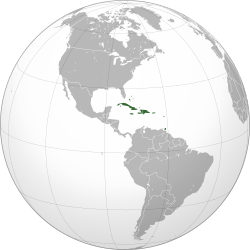Caribbean island
 |
|
| Area | 2,754,000 km2 (1,063,000 sq mi) |
|---|---|
| Land area | 239,681 km2 (92,541 sq mi) |
| Population (2016) | 43,489,000 |
| Density | 151.5/km2 (392/sq mi) |
| Ethnic groups | Afro-Caribbean, European, Indo-Caribbean, Latino or Hispanic (Spanish and Portuguese), Chinese Caribbean, Jews, Arab, Indonesians/JavaneseAmerindian |
| Demonym | Caribbean, West Indian |
| Languages | Spanish, English, French, Dutch, French Creole, English Creole, Caribbean Hindustani, among others |
| Government | 13 sovereign states 17 dependent territories |
| Largest cities |
List of metropolitan areas in the West Indies Santo Domingo Havana Port-au-Prince Santiago de los Caballeros Kingston Ocho Rios Santiago de Cuba San Juan Holguín |
| Internet TLD | Multiple |
| Calling code | Multiple |
| Time zone | UTC-5 to UTC-4 |
The Caribbean (/ˌkærᵻˈbiːən/ or /kəˈrɪbiən/) is a region that consists of the Caribbean Sea, its islands (some surrounded by the Caribbean Sea and some bordering both the Caribbean Sea and the North Atlantic Ocean) and the surrounding coasts. The region is southeast of the Gulf of Mexico and the North American mainland, east of Central America, and north of South America.
Situated largely on the Caribbean Plate, the region comprises more than 700 islands, islets, reefs and cays. (See the list.) These islands generally form island arcs that delineate the eastern and northern edges of the Caribbean Sea. The Caribbean islands, consisting of the Greater Antilles on the north and the Lesser Antilles on the south and east (including the Leeward Antilles), are part of the somewhat larger West Indies grouping, which also includes the Lucayan Archipelago (comprising the Bahamas and Turks and Caicos Islands) north of the Greater Antilles and Caribbean Sea. In a wider sense, the mainland countries of Belize, Guyana, Suriname and French Guiana are often included due to their political and cultural ties with the region.
...
Wikipedia
